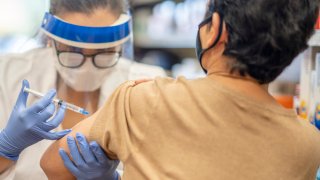
- Dr. Kavita Patel told CNBC on Friday some precautions are needed even after people are being fully vaccinated against Covid.
- That's because more information is still required on whether vaccinated people can give the virus to someone who hasn't been inoculated, she said.
- However, the former Obama administration policy aide said the "good news" is that smaller gatherings among fully vaccinated people will become safer.
Even after being fully inoculated against Covid, some public health precautions are still needed until more data on the vaccines can be collected, Dr. Kavita Patel told CNBC on Friday.
It's well understood the two-shot vaccines from Pfizer and Moderna are highly effective at preventing severe disease and death from Covid-19, Patel said in a "Squawk Box" interview. Less understood right now is how well the vaccines reduce transmission of the coronavirus.
In other words, someone who has been vaccinated has sharply reduced their risk of getting really sick from the coronavirus, but Patel contended precautions are still needed in the coming months if a small group is gathering and a person in that group has not been vaccinated.
"If you are in a household with small children [who don't yet qualify for the vaccine] or even children with a heightened risk ... or even yourself if you are at heightened risk despite being vaccinated, you should consider taking precautions when indoors, wearing masks. Stay outdoors with people if possible," said Patel, a primary care physician in Washington, D.C., and nonresident fellow at the Brookings Institution.
"The only reason I say that is because we do need more data to understand what this transmission risk is," she added.
Money Report
The Centers for Disease Control and Prevention this week adjusted its quarantine guidelines for people who have been fully vaccinated; both Pfizer's and Moderna's vaccines require two doses for full protection. The CDC now says within three months of being fully vaccinated, people who are exposed to the coronavirus do not need to quarantine if they do not develop symptoms.
Like Patel, the CDC acknowledges the risk of a vaccinated person transmitting the virus to someone else is "uncertain." But the reason for its modified quarantine guidance, the CDC said, is due to the vaccines showing strong effectiveness at preventing people from developing symptomatic Covid.
That's important because people who have Covid symptoms are believed to transmit the virus more than asymptomatic individuals, according to the CDC. For that reason, the agency said a fully vaccinated person who isn't showing symptoms doesn't need to quarantine.
The CDC defines full vaccination as two weeks after receiving the second shot of a two-dose vaccine or two weeks after getting a single-shot vaccine. Johnson & Johnson has applied for emergency use authorization for its single-dose vaccine, and an advisory panel is set to consider it at a meeting later this month.
Patel said she believes CDC quarantine guidance could be updated again as more Americans are vaccinated. But at this phase of the pandemic, she said the U.S. finds itself at an "in between period." Even though she said roughly 1 in 3 Americans have either been vaccinated or developed natural coronavirus antibodies due to prior infection, "we still have enough opportunity in the other two people to promote the spread of the virus, particularly a concern with these more transmissible variants."
To help illustrate, Patel offered insight into how she is personally approaching aspects of life now that she's been vaccinated. The former Obama administration official said she continues to wear a mask in public, even though she feels confident she won't get sick and die from Covid.
"I'm still doing all those things we've been talking about — that we are pretty fatigued from doing — until we have more data that I can't give [the virus] to somebody who has not been vaccinated," said Patel, who served as director of policy for the Office of Intergovernmental Affairs and Public Engagement in the Obama White House, where she worked on health-care initiatives.
However, Patel said there are reasons to be optimistic and mentioned how she's thinking through the possibility of seeing her parents soon. "Because I'm vaccinated and after they get several weeks in after that second dose, I am going to feel more comfortable talking about any risks because it's not 100% that they won't catch the virus, but I am comfortable potentially having a small gathering with them when we're all vaccinated together," she said.
While vaccine availability is limited right now, Patel noted the recent comments from Dr. Anthony Fauci on NBC's "TODAY" show. The nation's top infectious disease expert said he expects it to be "open season" for Covid vaccinations by April. If Fauci's forecast were to materialize, Patel said she believes more Americans will be able to gather safely by the summertime.
"As the months go on and more people in your household and potentially another household, like your parents or your grandparent are vaccinated, that could make smaller gatherings safer," Patel said. "That is something to look forward to because we've been holding off now for over a year, some of us, to see older parents and relatives with high risk."






